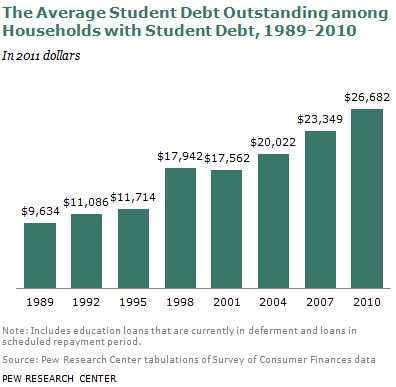 Just two decades ago, fewer than one in ten households held student debt. Now, rapid increases in the sticker price for college has driven more students and their families to take out loans. For most college seniors, the idea of “working your way through college” has all but vanished, replaced by the dread of high loan payments.
Just two decades ago, fewer than one in ten households held student debt. Now, rapid increases in the sticker price for college has driven more students and their families to take out loans. For most college seniors, the idea of “working your way through college” has all but vanished, replaced by the dread of high loan payments.
According to the Pew Research Center, student debt is exploding, with a record one in five households now holding student debt. But it’s not just the total number of borrowers that is increasing – it’s also the size of the loans. In 1989 the average student debt was a manageable $9,634. By 2010 it had nearly tripled, to $26,682.
By way of comparison, in 1989 it took an average graduate 2 years and seven months to pay off their student debt of $9,634 with payments of $350 per month. In 2010, it would take the same graduate 8 years and five months, and they would pay nearly 10 times as much in interest. (Note: This assumes a federal unsubsidized student loan rate of 6.8%).
High levels of student debt – brought on by shifting the cost of higher education to students and families – limits post-college options for graduates, and puts a damper on economic growth. Studies show growing debt-to-income ratios among grads are locking many otherwise-qualified borrowers out of the housing market, and research also indicates individuals with student loans are less likely to start a business, and more likely to delay major purchases such as a car or home.
That’s a worry for Washington’s economy, which – like others – is heavily dependent on strong consumer demand.
More To Read
September 24, 2024
Oregon and Washington: Different Tax Codes and Very Different Ballot Fights about Taxes this November
Structural differences in Oregon and Washington’s tax codes create the backdrop for very different conversations about taxes and fairness this fall
September 10, 2024
Big Corporations Merge. Patients Pay The Bill
An old story with predictable results.
September 6, 2024
Tax Loopholes for Big Tech Are Costing Washington Families
Subsidies for big corporations in our tax code come at a cost for college students and their families
